Osaka: Neon lights, fried food, and all that jazz
If you’re after the delights of any well-sized city, Osaka doesn’t beat around the bush. It helps, though, if you know where to look. Alex and I spent our first night being turned away from bars, with the owners citing “last orders” and seeing us off with large bows, but they, along with their entirely Japanese clientelle, were still there and in no shortage of booze when we walked past them on our way back to the hotel an hour later.
Not a great start for one of Japan’s cosmopolitan cities, but then again, I hadn’t slept in 24 hours and Alex was trying her best to deny the existence of jet-lag, so the last thing either of us looked like we needed was beer. And it would have been a waste, anyway, to have spent much of our precious Yen in the business district (where Alex had found a cheap and comfortable hotel) when the first place any self-respecting tourist on a night out in Osaka heads to is Dotonbori.
A Picadilly Circus of sorts
Osaka’s famous ‘running man’, advertising something. Probably a snack
A capsule ride fronting a famous department store called Don Quixote. Think London Eye, if it were built in front of Harrods, with Harrods being an eight-storey corner shop.
Missing our hotel breakfast gave us the opportuinty to try an Osaka street-food specialty: okonomiaki is variously described as a Japanese pancake, omlette or (inaccurately) pizza, but actually it’s not really any of these things. Alex and I, although usually scrupulous in remembering to photograph our food, were distracted by our first encounter with a particularly annoying Japanese habit of putting fish flakes on everything, especially foods they feel are lacking in meat (ie, Alex’s attempts at vegetarianism). These flakes, sitting atop steaming hot food, writhe and wriggle due to the heat, meaning at first glance after opening our takeaway box they looked like a swarm of meal-worms. The addition of this quite unappetising surprise is so expected in Japan that they never bother to ask if you want it added, even when you have tried to specify a vegetarian meal. They did, however, double check if we were OK with mayonnaise.
The next evening (after our trip to Koyasan), Alex decided she was taking no chances with dinner and found a recommended tempura restuarant. We wandered through the streets of Dotonbori, through covered malls and narrow alleyways, everywhere swarmed with people, in search of the restuarant. Addresses don’t really work in Japan - the closest thing you’ll ever get to one is a town, neighbourhood and then a three-digit number indicating when that building was built relative to the other ones in the area. So finding restuarants from guide books and online reviews is difficult, approaching impossible when the restuarant sign itself is only written in Kanji (Chinese characters used in Japanese, one of their three character sets). Still, this gave us the chance to see some interesting sights. Tucked away among Japanese lanterns amid a busy thoroughfare, monks chanting in unison around a shrine attracted tourists and locals alike, both to take photographs and participate in the services before finding the nearest izakaya and getting the beers in. A giant crab plastered to the side of a building slowly moved its legs, advertising the sea-food offerings in the restuarant below. Tax-free shops sold wares ranging from hangover-cure pills to “Young Lady Sexy Lingere”.
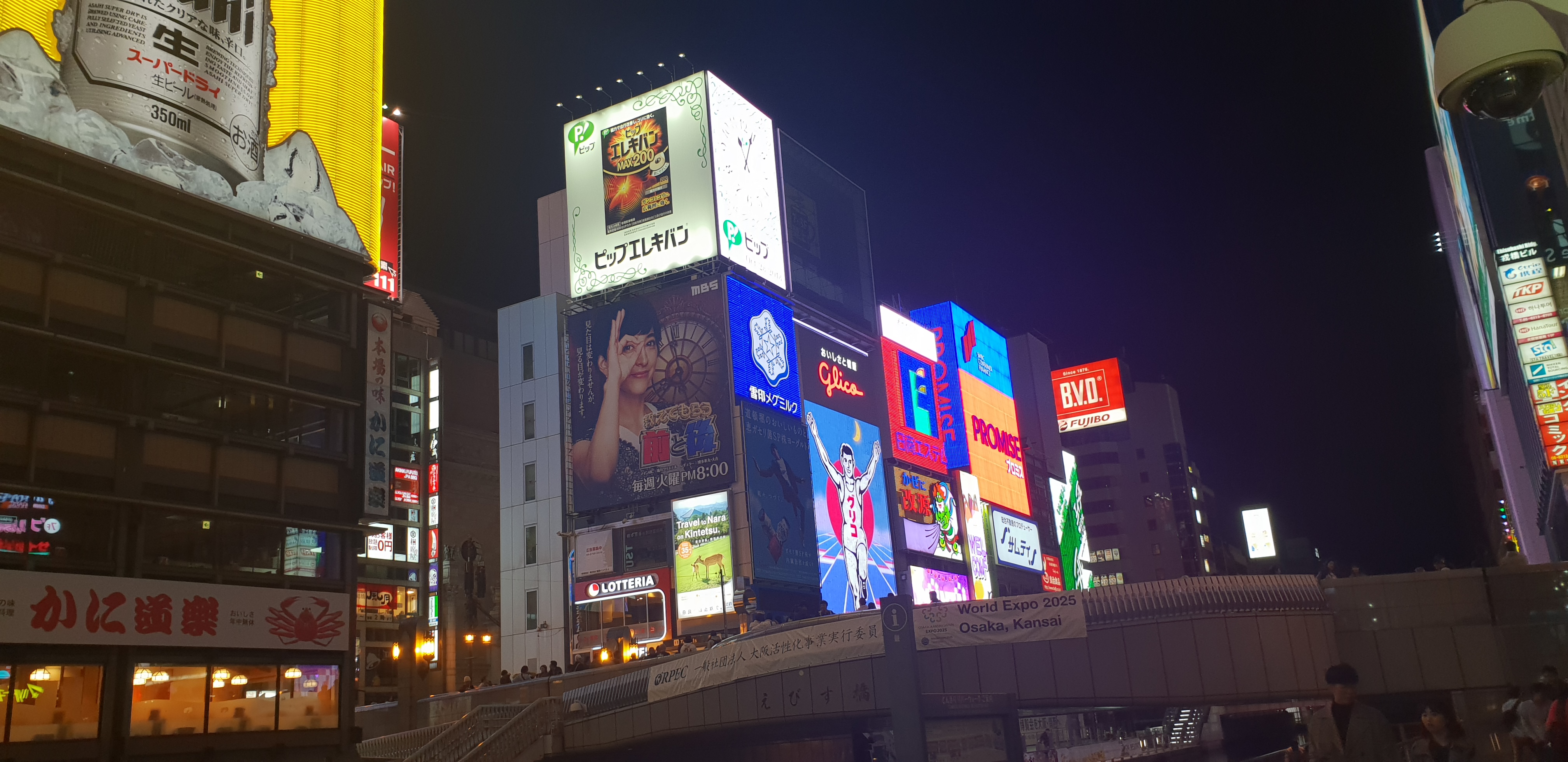
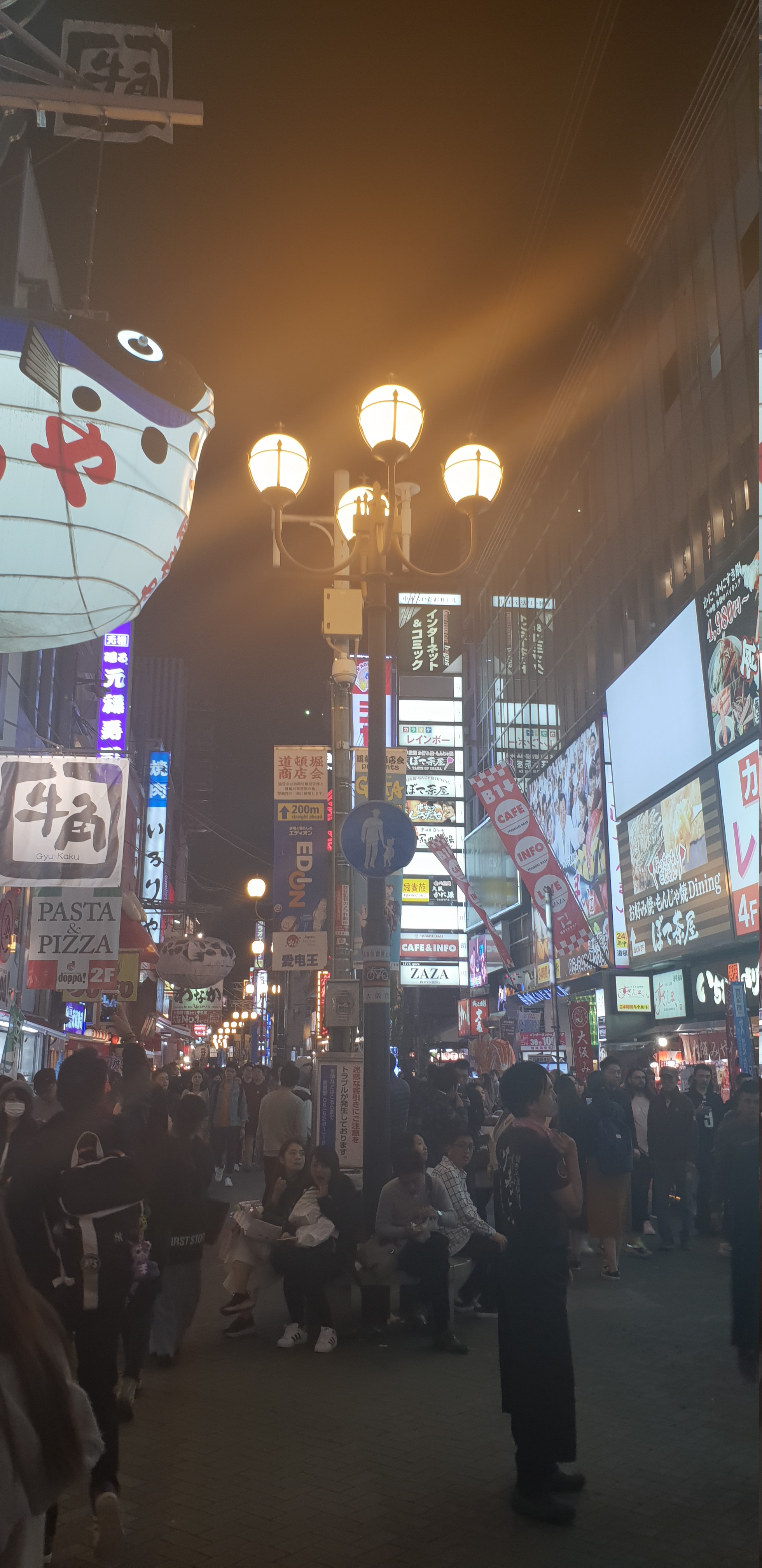 Osaka by night
Osaka by night
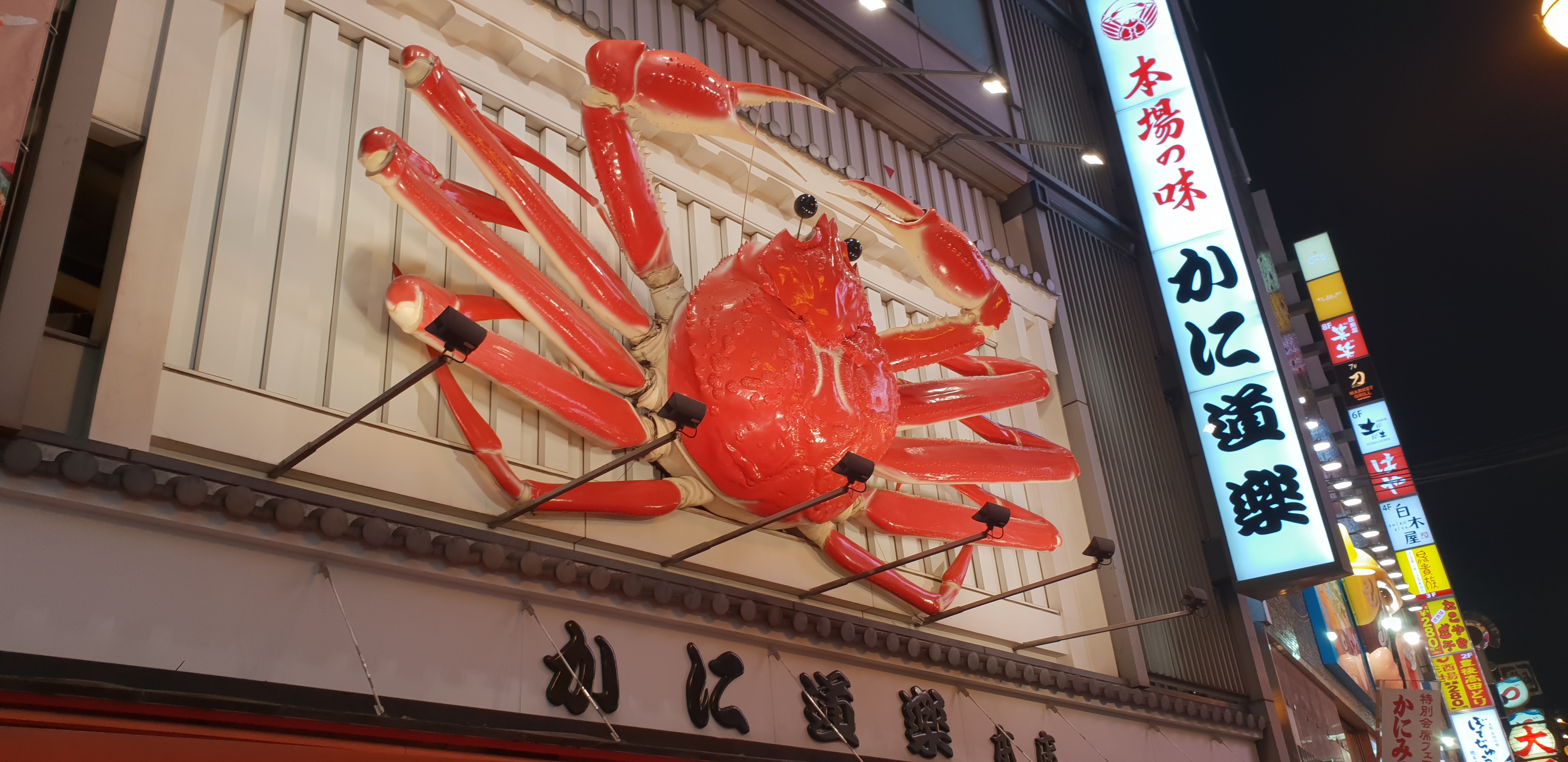 “Come to Osaka, we’ve got crabs”
“Come to Osaka, we’ve got crabs”
The meal itself was excellent: tempura ordered by the dish, made fresh in front of us. We got chatting to a local sitting next to us at the counter with his young son - he had overheard our English accents and struck up a conversation. He spoke the best English of anyone we’d heard so far, and we soon found out why: it turned out he had lived in London between 1993 and 1995. “Doing what?” we enquired. He told us he had been a house DJ at Ministry of Sound for two years. We chatted about the house scene in Japan vs UK, football, which ageing former Premier League players were now playing in Japan, his son’s favourite player (Harry Kane, of course). He offered us some of his sake and we returned the favour when we ordered a bowl ourselves. Before he left we exchanged details and the vague notion of looking each other up when he’s next in London. It seemed an incredible coincidence that, among the thousands of people milling around the streets of Osaka, we’d got chatting to someone who used to DJ at a famous London nightclub only a short tube ride away from home. Japan may not have a reputation for being particularly international, but like all preconceptions you might have about this country, their exceptions are what makes Japan Japan.
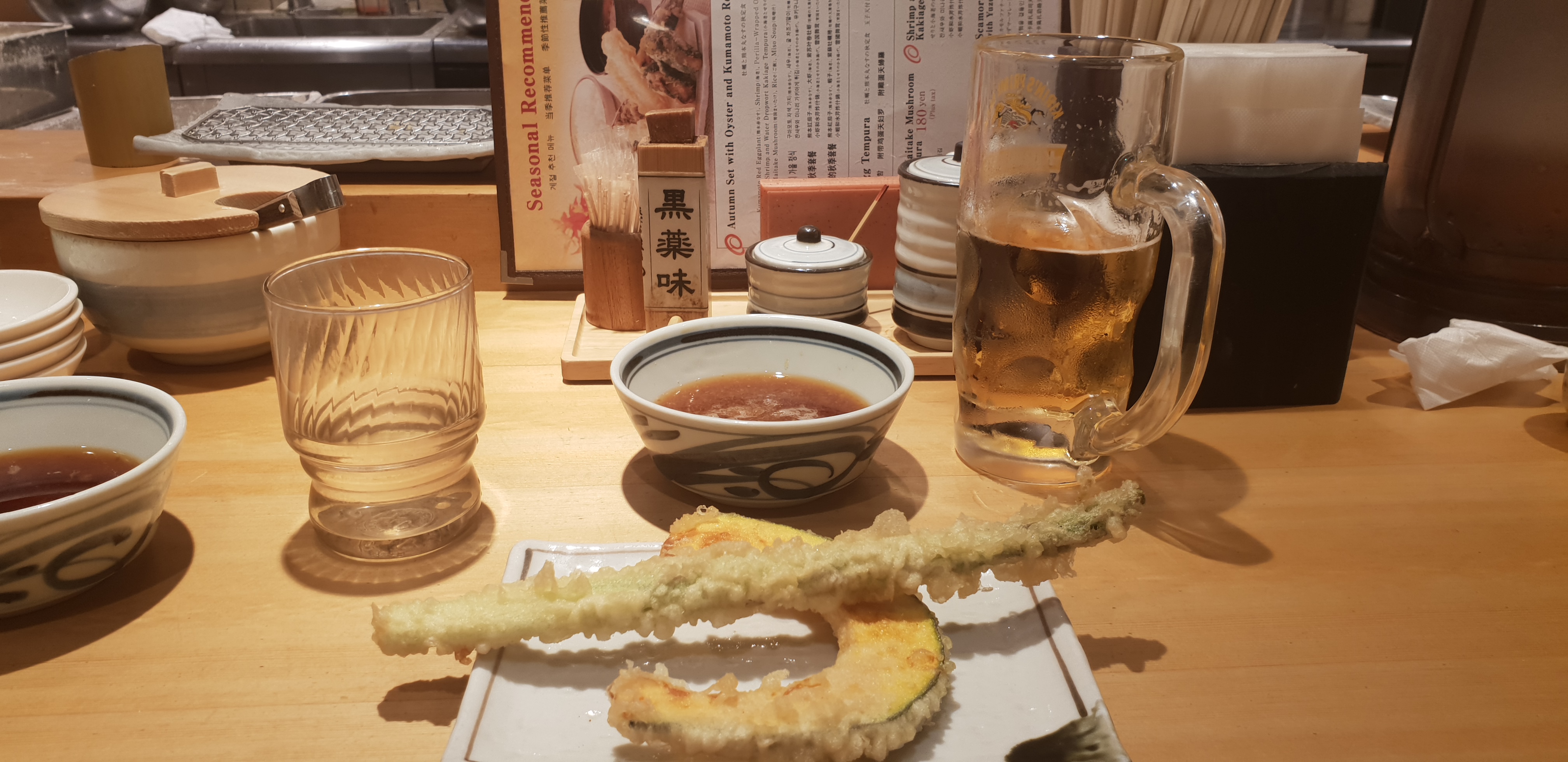 Vegetable tempura. They also made us an egg tempura (runny in the middle, delicious), which we couldn’t work out how they made, despite watching closely
Vegetable tempura. They also made us an egg tempura (runny in the middle, delicious), which we couldn’t work out how they made, despite watching closely
We then went in search of the jazz bar whose sign we’d seen while looking for dinner. But nothing in Japan is so simple, and retracing our steps only led us round in disorientating luminescent circles. After several false starts, we found the place, on the third floor of a narrow building, fronted by a sign in English warning us about high prices and the owner’s passion for jazz.
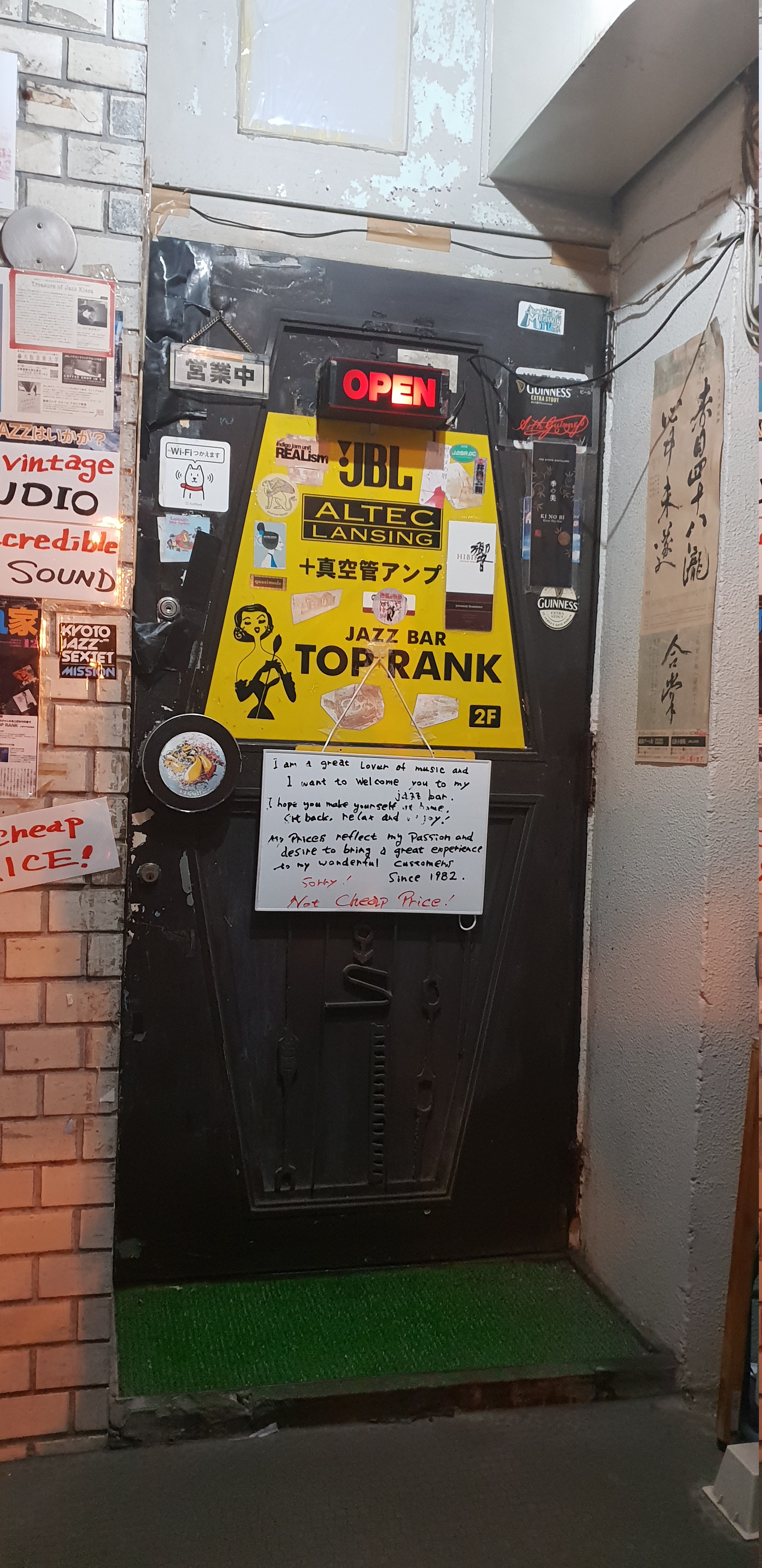 Honesty as a policy
Honesty as a policy
Inside we found something completely unique to Japan - a jazz kitassen, or a bar where the owner has spent lavishly on a highly-specced sound system and lovingly accumulated a large collection of jazz records. I ran around excitedly looking at record spines, bugging the owner about which Clifford Brown recordings he had, and he in return proudly showed off his sound system, consisting of a variety of turntables and a beautiful valve amplifier. It was a conversation which required very little English, much like the one we had with a table of drunk salarymen, one of whom managed to communicate that he doubled on trumpet, trombone and saxophone, and another of which showed us his illustrations of Paul & Linda McCartney and John Lennon (probably owing to the fact that we were English).
As I write this, we’re on the shirkansen about to pull into Tokyo, having spent three nights in Kyoto (blog post pending), but I think this still ranks as my favourite Japanese experience so far. Though the temples and high-tech culture are what usually comes to mind when you think of Japan, their passion for contemporary culture, and their obsessive cataloguing of it, is one of my favourite traits, particularly when it comes to jazz. In Japan, it’s possible to open a bar on the third floor of a building in the middle of Osaka, fill it with just three tables and wall-to-wall shelves of jazz LPs and CDs, add a huge speaker stack which hammers away at the back of patron’s heads, which have to be squeezed past to reach the toilet, of the humble old squat style, and still be able to charge exorbitantly for drinks whilst maintaining a small crowd on a Sunday night. It’s something I can’t imagine anywhere else in the world.